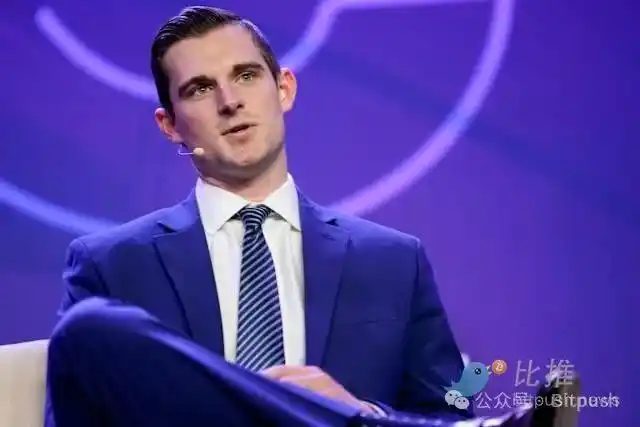29-Year-Old Rugby Player Makes Unexpected Journey to the White House: The Rise of Trump's "Crypto Advisor" Bo Hines
「I hope that one day, my son will grow up to see his father play an indispensable role in driving the financial revolution and advancing America.」
Original Title: "29-Year-Old Takes Over the White House! Trump's 'Youngest Crypto Advisor' Bo Hines Leading Regulatory Reform"
Original Author: BitPush
Bo Hines previously assisted the Trump campaign's top-tier super PAC with ad affairs. Trump has appointed Hines to lead a bold initiative aimed at formulating crypto-friendly regulatory policies and overturning the Biden administration's crackdown on the industry.

In March of this year, during the first-ever cryptocurrency summit held at the White House by Donald Trump, several top advisors sat around him. To his right was Treasury Secretary Scott Bessent, to his left was the Head of Cryptocurrency and AI Affairs, venture capital titan David Sacks. Adjacent to Sacks, however, was a figure who just a few months before was completely unfamiliar to everyone in the room: 29-year-old former congressional candidate and college football wide receiver Bo Hines.
Bo Hines previously assisted the Trump campaign's top-tier super PAC with ad affairs. Trump has appointed Hines to lead a bold initiative aimed at formulating crypto-friendly regulatory policies and overturning the Biden administration's crackdown on the industry.
1111_On March 7, 2025, President Trump meets with David Sacks and Bo Hines at the White House Digital Asset Summit
From Unknown to Celebrity
In his first 30 days as Executive Director of the "Presidential Advisory Council on Digital Assets," Bo Hines has become a celebrity in the crypto world. Numerous CEOs and billionaire investors are eager to schedule time with him, while lobbyists are eager to engage with him face to face.
Bo Hines's schedule obtained through the Freedom of Information Act by Fortune magazine shows that in his first 30 days in office, he met with over 50 crypto lobbyists, investors, company founders, institutional officials, and bankers.
His meeting attendees include Chris Dixon and Marc Andreessen of top Silicon Valley investment firm Andreessen Horowitz, Ripple CEO Brad Garlinghouse, and Caroline Butler, the Head of Digital Assets at BNY Mellon.
Some of these meetings have taken place in the White House, some in coffee shops, Zoom video conferences, or at the oldest dining saloon in Washington, D.C., the Old Ebbitt Grill.
“I want to meet everyone in this field—the big players, the small players,” Hines recently said in an interview with Fortune at the Israel-inspired American coffee shop Tatte near the White House. “I want to hear from everyone.”
Despite David Sacks' decades of business experience from his early days at PayPal and Craft Ventures and his higher position, due to his part-time role as a government employee (limited to working 130 days per year), the unknown Hines has taken on more day-to-day affairs, with a spokesperson for the White House Office of Science and Technology Policy (OSTP) insisting that the two are “working side by side.”
Sitting at a desk on the fourth floor of the Eisenhower Executive Office Building, Hines has become one of the most influential figures in the crypto world. He is effectively the primary liaison between the White House and the cryptocurrency industry, working to translate the industry's grievances into concrete policies.
Amid Trump's tariff offensives that have roiled global markets and led to drastic digital asset price swings, Hines faces more challenges. Trump's erratic economic policies have caused a sharp drop in the stock prices of blockchain-related companies, and the potential economic crisis may further suppress the increasingly stock market-linked crypto market. In short, Trump's on-again, off-again tariff wars may reverse the economic progress the blockchain industry has made in recent years.
To understand Trump's initial months of cryptocurrency agenda and the individuals attempting to execute this agenda, Fortune interviewed this young man and spoke with over a dozen people who have met or spoken with him since January. Most requested anonymity due to privacy concerns.
They evaluated Hines as lacking cryptocurrency experience but quick to learn and eager to understand this rebellious industry seeking legitimization—even as the industry is embroiled in factional infighting. “He's like drinking from a firehose,” said a cryptocurrency executive and D.C. insider. “For anyone in the cryptocurrency space, he is the industry's first point of contact with the White House.”
Crypto – From the Edge to the Center
When Hines' spokesperson suggested a meeting at Tatte near the White House, he, due to previous meeting delays, mistakenly went to two different locations before finally arriving at the third Tatte of the day (in a dark gray suit, smiling), immediately diving into the cryptocurrency topic.
Clean-shaven and well-groomed, Hines exuded a savvy demeanor honed from two unsuccessful congressional bids in North Carolina (both in 2022 and 2024). Speaking rapidly and decisively, he repeatedly praised Trump, insisting that cryptocurrency regulation should be a bipartisan consensus. Clearly, this 29-year-old is not willing to be seen as a political novice but rather hopes to be viewed as a Trump ally who can get things done.

「We respect the President, appreciate his work, and admire his 'America First' stance — the crypto field is no exception.」
Once led by outsiders and government skeptics, the crypto industry has recently cozied up to Washington politicians. FTX founder Sam Bankman-Fried has spent tens of millions of dollars supporting pro-blockchain politicians in an attempt to push for comprehensive regulatory legislation. However, as his exchange platform faced backlash, the Biden administration launched enforcement actions, suing top companies like Coinbase (SEC accusing them of not registering properly).
Under the leadership of Coinbase and other industry giants, blockchain-related groups and individuals donated nearly $250 million to pro-crypto politicians from both parties during the last election cycle. Their efforts finally paid off: former Bitcoin skeptic Trump transformed into a crypto evangelist. During his campaign, he promised to establish a federal Bitcoin reserve, promote crypto-friendly legislation, and attracted top venture capital support like Andreessen Horowitz, who had previously complained about being neglected by the previous administration.
After winning the election in November 2024, Trump began to fulfill his promises, including appointing Solana supporter David Sacks and Hines to the technology policy office under the President's Executive Office. Once in office, Trump signed multiple executive orders: establishing a crypto policy task force led by David Sacks, creating a government strategic crypto reserve, and more.
Unlike the Biden administration, Hines has become a friendly interface for industry executives and policy advisors. An executive who has met with Hines five times described him as more of a "opinion collector" for the crypto industry, as David Sacks, due to time constraints and AI policy priorities, only meets with the CEOs of the top 20-40 companies. The executive said, "Hines can meet with the next 100 companies." A lobbyist revealed that Hines is even willing to provide his phone number proactively.
Trump's crypto agenda includes pushing Congress to pass a stablecoin regulatory bill, assisting the SEC in developing token issuance guidelines, and more. However, for executives, the primary goal is just to "get in the room." Although Trump originally planned to form an industry leader "Crypto Council," the White House shifted to hosting summits due to the "insanity of seat-grabbing" (as described by one executive). Hines stated that this was a misunderstanding of the outside world's "enthusiasm" and emphasized it was to "hear more voices."
Even the hosting of the first White House Crypto Summit sparked an industry leader "invitation battle" — the final list of about 25 executives (many of whom were Trump campaign donors) was not announced until the day of the event. "Many people's egos were bruised," one lobbyist described the White House as being like the "wild west" with a lack of organization and communication.
Nevertheless, the March summit still marked a significant victory for the crypto industry. Sitting just one seat away from Trump, Hines witnessed a month full of heavyweights crowding his schedule.
“This is the White House— who wouldn't want to come?” Hines said. “The fact that the President held this event for the industry itself signifies a major shift, indicating the maturation of this industry.”
For some observers, Trump's crypto policy was a highlight amid Washington's chaos. “Crypto has not yet been caught up in the other messes of Washington, which is pretty amazing,” said lobbyist Scott Shewcraft, who works with multiple financial services companies.
However, former SEC Chair Gary Gensler's chief of staff and now left-wing think tank Better Markets policy director Amanda Fischer is deeply concerned. She believes that the government establishing a crypto reserve to support specific asset prices, along with certain executive orders, could erode federal agency independence. “Their policy actions will benefit a few individuals and companies while sacrificing American investors and financial system stability.”
A bigger challenge comes from Trump's trade war. Bitcoin surged from $70,000 to over $100,000 between Trump's election victory (November 2024) and his inauguration, but plummeted 10% since the tariff declaration on April 2 (partially rebounding due to Trump's policy rollback). Related company stocks also took a hit: Coinbase shares experienced their worst quarter in two years, dropping an additional 15% after the tariff announcement, with a partial recovery post-policy rollback.
When asked about the market volatility by Fortune, the OSTP spokesperson did not directly respond, only stating that “the American people will benefit from the President's leadership in the digital asset space.”
With Great Power Comes Great Responsibility
Externally, Hines might not seem like the best fit to lead Trump's crypto agenda. Despite his close relationship with Trump, his experience in the crypto field is limited, and he has had minimal interactions with major crypto companies in the past.
In 2014, following the Bitcoin St. Petersburg Bowl sponsored by crypto company BitPay, Hines became interested in crypto transactions.
Subsequently, Hines co-founded the Charlotte-based investment firm Nxum Group and led its political arm. According to Federal Election Commission disclosures, a week before the 2024 election, Nxum donated $1 million worth of promotional ads to MAGA Inc. (one of the largest pro-Trump super PACs). He also serves as the CEO of Nxum's affiliated investment firm Today Is America, which once managed a social media platform promising to donate token sale proceeds to a conservative youth organization.
Four years after graduating from Yale University, Hines began a brief political career, running for North Carolina State Representative twice (both unsuccessful). Trump endorsed him in 2022 but was unable to help him win.
Since Trump took office, the crypto industry has achieved some goals: the SEC dropped lawsuits against Coinbase and Ripple; the President pardoned Ross Ulbricht, the founder of the darknet market Silk Road—who was serving a double life sentence for aiding drug trafficking and money laundering—a pardon supported by the crypto industry's liberal camp.
However, Hines' path remains challenging. His top priority is to push for a stablecoin regulatory bill (which, if passed, would be the first significant legislation for the blockchain industry). Hines emphasized the importance of bipartisan consensus for legislation but admitted he has not yet reached out to any Democratic lawmakers, noting that Republicans are engaging in bipartisan efforts while he focuses on reaching out to policy organizations involved with Democratic lawmakers.
Since his victory in November 2024, Trump has extensively reformulated the crypto regulatory approach:
· Appointed David Sacks and Bo Hines as White House Crypto Advisors
· Signed an executive order to establish the U.S. Bitcoin Reserve and Digital Asset Reserve (funded by criminal and civil forfeitures)
· Pardoned Silk Road founder Ross Ulbricht
· Hosted the inaugural White House Crypto Summit, inviting 25 industry leaders to discuss policy
· Reversed the Biden-era crypto policies, creating a task force composed of the Treasury Secretary, Commerce Secretary, and others to advance blockchain regulation
· Requested Congress to submit two critical crypto bills before the August recess
A more daunting task is to push for comprehensive crypto legislation, establishing a regulatory framework for token issuance, exchange operations, and ending the industry's years-long compliance ambiguity. Trump hopes to sign these two bills into law before Congress adjourns in August. "We will do everything we can to move forward," Hines said. "The President is very committed to fulfilling his promises to the industry."
In addition to legislation, Hines is also engaging with institutions like the SEC (which is shifting toward a more lenient regulatory stance) and considering hosting summits focusing on specific areas such as mining, exchanges, and venture capital.

This new dad also hopes to balance his career with family life—he and his wife welcomed a son last fall, with his wife spending about a quarter of her time in North Carolina, while Hines is almost constantly in Washington, D.C. "I hope that when my son grows up, he can see that his father played an indispensable role in advancing the financial revolution and helping America move forward."
Disclaimer: The content of this article solely reflects the author's opinion and does not represent the platform in any capacity. This article is not intended to serve as a reference for making investment decisions.
You may also like
TRUMPMEME: Trump's "TRUMP DINNER" dinner will be held in Washington on May 22
TRUMP briefly breaks through $16
Ethereum Mainnet to Execute Pectra Upgrade on May 7
A whale bought more than 400,000 TRUMPs after the "TRUMP Dinner" news was released
